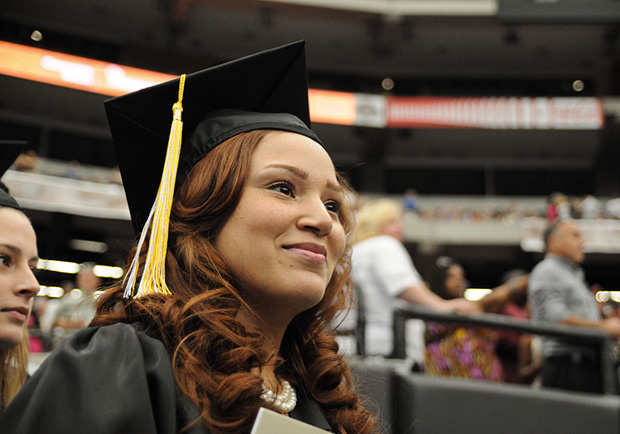All over the country, 17- and 18-year-olds are nervously awaiting college admissions' decisions. I remember my own chagrin in April of my senior year when, after tearing into a thin envelope from the University of Virginia, I learned I'd been wait-listed.
However, with increasing tuition costs (on average, $30,000/year for private colleges and $22,000/year for public universities), we're rethinking the value of a college education. It's well-proven that you don't need a college degree to make money. Just look at Bill Gates, Steve Jobs, Mark Zuckerberg, and even more recently, Nick D'Aloisio—a 17-year-old who sold his news-reading app to Yahoo for millions. If money were the only consideration, college may not be the best choice for today's young people.
Peter A. Thiel, himself a graduate of Stanford, lures bright, young entrepreneurs away from college with a two-year, $100,000 fellowship. The first Thiel fellows graduate this spring with real-world experience in launching businesses and pursuing research interests — a gain greater, some think, than letters behind one's name. Tony Wagner, an education specialist and author of Creating Innovators: Young People Who Will Change the World, champions this alternative view of education. He pushes for less emphasis on content and more on curiosity and creativity.
"Every young person will continue to need basic knowledge, of course," explained Wagner in a recent New York Times article. "[But] young people who are intrinsically motivated — curious, persistent, and willing to take risks — will learn new knowledge and skills continuously. They will be able to find new opportunities or create their own — a disposition that will be increasingly important as many traditional careers disappear."
In an economy where creativity and curiosity can trump core content knowledge, traditional college education can easily be viewed as an investment of diminishing returns. If college is merely a pragmatic means of securing a set of marketable skills — and a salary — then perhaps Thiel, Wagner, and the rest are right. There are cheaper, more efficient ways than college to get a job, especially as tuition steadily increases faster than the rate of inflation. But as Americans, and as Christians, we must also ask ourselves: What do we believe to be the value of higher education? Is there something more?
Historically, religious leaders in the U.S. promoted higher learning. Standing on the backs of the Reformers and their commitment to education, our Puritan fathers founded such prestigious academic institutions as Harvard, Yale, and Dartmouth. Mark Noll notes in the opening chapter of his book, The Scandal of the Evangelical Mind, "Of the many striking features of the Puritans, one of the most remarkable was their zeal in developing a Christian mind."
The Puritans' desire to engage the mind reveals their robust theology: they believed the biblical mandate to love God with all dimensions of human personhood, including one's intellectual capacities. They also, as Noll writes, "viewed the whole of life as a gift from the God of grace. They did not separate social, ecclesiastical, and theological concerns into artificially separated categories."
This Puritan approach to education (and by extension, work and career) as a means of worship translated for a long time into a broader, cultural agreement on the moral importance of education. David Brooks, in The Atlantic, traces the trajectory of meaning Americans have historically ascribed to education. While today's students and graduates are more likely to see college as a means to achieving professional success and financial security, students from earlier eras believed in the power of education to cultivate virtue and instill character.
Curriculum reflected these high-minded ideals, pushing students to master a broader theoretical knowledge base. Robert Maynard Hutchins, who became president of the University of Chicago in 1929, championed a particularly ambitious four-year liberal arts curriculum there in order to fight what he saw as "the peculiar brutality and aggressive stupidity with which a man comports himself when he knows a great deal about one thing and is totally ignorant of the rest."
If today's students are nudged toward narrowing their interests, students of earlier generations were invited to broaden their curiosities. They were invited into the "leisure of conversing with the greatest minds and souls of the past" (Charles Malik, The Two Tasks). Because this kind of education granted to students an understanding of their historical moment, it almost necessarily commended to them a sense of moral duty. In his 1913 address to graduating students, Princeton's president John Hibben sounded almost like a preacher: "The world expects you to produce as well as consume, to add to and not to subtract from its store of good, to build up and not tear down."
But this moral imperative has since eroded, and college is viewed more and more pragmatically as the place to earn one's career credentials. Perhaps this will seem to have been necessary. Who can afford learning for learning's sake? Still, Christians might thoughtfully reconsider the utilitarian language used describing the value of education today. A college degree isn't only to be equated with job preparation and salary potential, and the value of college is far greater than the sum of a student's potential earnings.
As Christians, we can value the kind of educational apprenticeship college is. It depends on a singular and sustained act of humility. In college — or in any classroom or church pew, for that matter — students learn to admit that not all knowledge is within reach of their powers of curiosity and creativity, and there is a greater conversation than the contemporary one. And as David Brooks notes in a recent column for the New York Times, there is a dimension of knowledge that "can[not] be taught and memorized; it can only be imparted and absorbed." This would seem to be an argument for the continuing value of teachers and the classroom — even for college.









